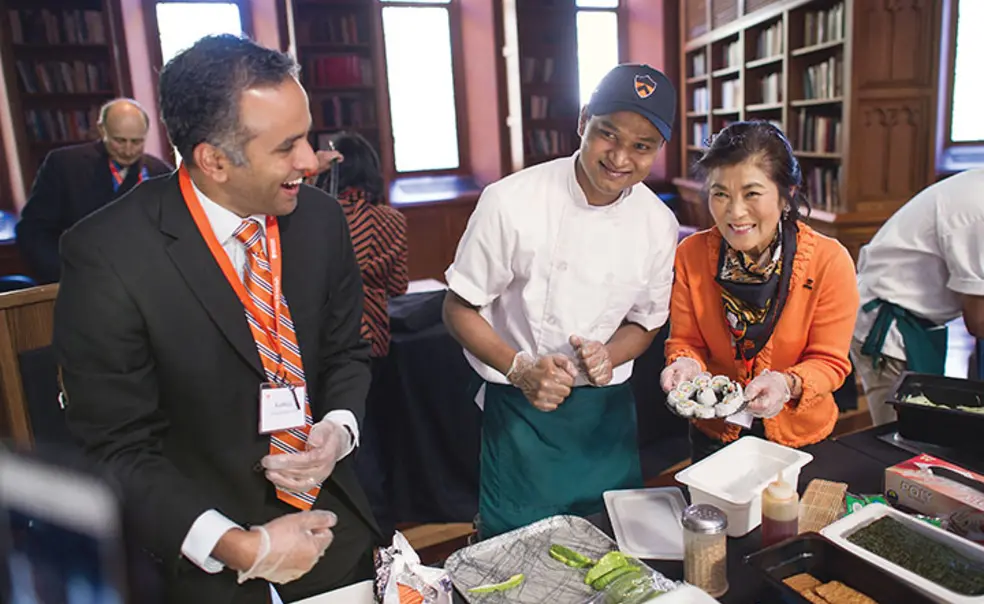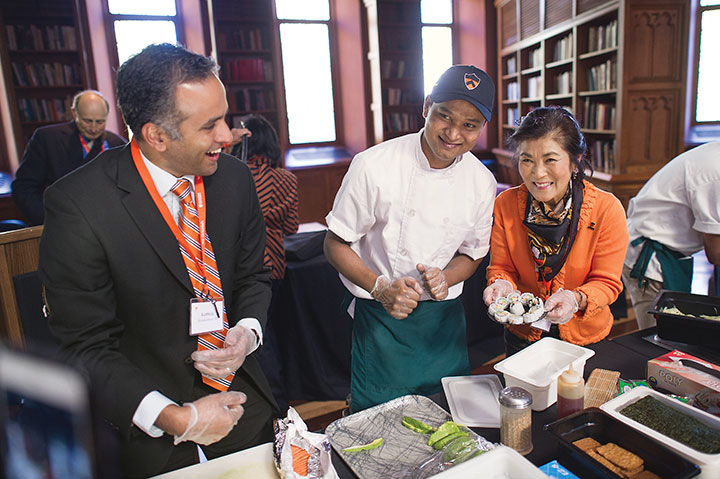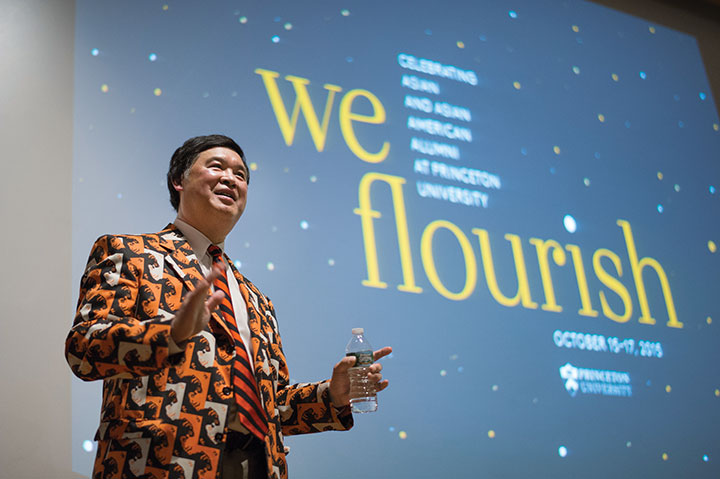Asian American Conference: Flourishing Alums Return
Celebrating gains and challenges for Asians and Asian Americans, who feel like ‘outsiders and insiders’
Approximately 730 Asian and Asian American alumni from across the decades and around the world returned to campus Oct. 15–17 for “We Flourish,” the first conference for them at Princeton.
“I am excited about what this group can do together,” said Provost David Lee *99, the University’s highest-ranking Asian American administrator, as he welcomed the attendees, who were resplendent in Reunions jackets and other orange and black attire. “Because when you flourish, Princeton flourishes.”
“Without your being ambassadors for Princeton, and as role models for future students, today’s students would not have seen Princeton as a place to aspire to and about which to dream,” Lee said.
A 16-minute film shown to attendees outlined the history of Asians at Princeton, starting in 1876, when Japanese student Hikoichi Orita became the first to receive a diploma. (The film can be viewed at the Alumni Association’s website at alumni.princeton.edu/goinback/conferences/aaac.) Asian and Asian American enrollment, which has surged in recent years, accounts for 22 percent of this year’s freshman class.
President Eisgruber ’83 reiterated his desire to deepen the field of Asian American studies, saying that the University continues to recruit faculty “who can make a difference” in the area, but did not commit to a timeline. He announced the appointment of a task force, to be chaired by professors Anne Anlin Cheng ’85 and Hendrik Hartog, to look at the future of American studies at Princeton with specific emphasis on the role of Asian American studies within that field.
“I think we should do something really special here that will matter intellectually, not only to our own students and not only to our own campus, but to the world,” Eisgruber said.
At a panel discussion later in the weekend, Cheng called the lack of an Asian American studies concentration “simply a glaring omission in our otherwise excellent liberal-arts curriculum.”
Over three days, the alumni had a chance to sample a wide variety of events and forums, from a conversation with businessman Gordon Wu ’58 to an exhibition of sushi making to a Scotch tasting with Sanjeev Kulkarni, dean of the Graduate School.
Several current students shared their perspectives on being Asian or Asian American at Princeton today, including the burdens of being seen as a “model minority.” Chex Yu, from China, said non-Asian students in her graduate classes at the Woodrow Wilson School expect her to be an expert in all matters of Chinese policy: “After a while I kind of liked it because of the contribution I could make.”
Aoi Senju ’16 noted that there were few Asians in the upstate New York town where he grew up, but that he found many role models among fellow students in the Asian American Student Association, which he joined shortly after arriving on campus. “The reason that I want to work hard is to be that role model for the people who come after me,” Senju said. Added classmate Ella Cheng ’16, the USG president: “Princeton has made me even more proud of my Asian American identity.”
Other panels during the weekend addressed topics ranging from “Creativity, Innovation, and Entrepreneurship” to “Educating and Parenting the New Generation” to “Breaking the Bamboo Ceiling.”
During a forum on public service, Rose Li *92, who ran unsuccessfully for Maryland’s House of Delegates in 2014, urged more engagement in government and public affairs. “Asian Americans are one of the wealthiest and most educated populations in the United States,” she observed, “yet they are one of the least involved civically.”
Daniel Jae-Won Lee ’93, executive director of the Levi Strauss Foundation in Singapore, which advocates for human rights, said the weekend brought mixed emotions. “For many of us, it’s a renegotiation and a reset of our experience at Princeton,” he said, describing the feeling many Asian students have of being “outsiders and insiders at the same time.” He suggested that the conference title, “We Flourish,” could sound self-congratulatory. “If that’s it, then throw it out the window,” Lee said. “But if it’s about empathy to raise up others in the community, then it is worthwhile.”
Harold Y. Kim *93, who traveled from Hong Kong, called the conference “brilliant and long overdue.” It follows several other conferences that the University has hosted over the last decade for African Americans, women, graduate alumni, and LGBTQ alumni. The Alumni Association will host a conference celebrating 100 years of Jewish life at Princeton in April.
In remarks at a closing dinner, Chris Lu ’88, a former adviser to President Barack Obama and now deputy secretary of the Department of Labor, noted that “a gathering like this would have been impossible when we were undergraduates.” Acknowledging the breadth of the Asian community, which stretches geographically from India to the Far East and from 10th-generation Chinese Americans to new immigrants, Lu concluded, “We need to continue this conversation.”
Federal appeals court judge Denny Chin ’75 was glad that the event brought to campus many Princetonians who had not been connected with the University recently. “I’ve seen people this weekend I haven’t seen in 30 years,” Chin said.
Huan Zheng ’05 lives in New York, but had only been back to campus once since graduation. She gave the conference high marks. “This is the highlight of my Princeton career,” she said, “and it happened 10 years after I graduated.”














No responses yet